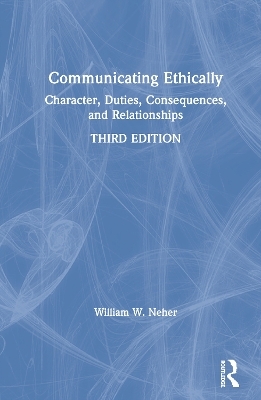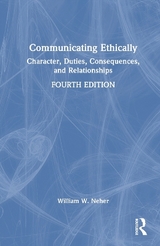
Communicating Ethically
Character, Duties, Consequences, and Relationships
Seiten
2020
|
3rd edition
Routledge (Verlag)
978-0-367-35430-5 (ISBN)
Routledge (Verlag)
978-0-367-35430-5 (ISBN)
- Titel erscheint in neuer Auflage
- Artikel merken
Zu diesem Artikel existiert eine Nachauflage
This thoroughly updated third edition of Communicating Ethically provides a broad introduction to the ethical nature of communication, bringing together classical and modern theories of ethical philosophy to address issues at play in specific careers and domains throughout the field.
By incorporating a simple framework for ethical reasoning, the reader will be able to develop their own understanding of the various criteria for making ethical judgments. Communicating Ethically applies ethical theories such as virtue ethics and dialogic ethics to contexts of interpersonal, organizational, political, and digital communication. This edition contains expanded coverage of contemporary and non-Western theories and contexts, including Black Lives Matter, #MeToo, social media and "fake news," and concerns of inclusion and marginalization. Each chapter contains a Preview and Key Ideas sections, and the book contains a Glossary.
This book serves as core textbook for undergraduate courses in communication and media ethics, and can also serve as a supplemental resource for field-specific courses in Strategic Communication, Interpersonal Communication, and Public Relations.
Online resources for instructors include sample syllabi, sample assignments, and quiz questions. They are available at www.routledge.com/9780367358471.
By incorporating a simple framework for ethical reasoning, the reader will be able to develop their own understanding of the various criteria for making ethical judgments. Communicating Ethically applies ethical theories such as virtue ethics and dialogic ethics to contexts of interpersonal, organizational, political, and digital communication. This edition contains expanded coverage of contemporary and non-Western theories and contexts, including Black Lives Matter, #MeToo, social media and "fake news," and concerns of inclusion and marginalization. Each chapter contains a Preview and Key Ideas sections, and the book contains a Glossary.
This book serves as core textbook for undergraduate courses in communication and media ethics, and can also serve as a supplemental resource for field-specific courses in Strategic Communication, Interpersonal Communication, and Public Relations.
Online resources for instructors include sample syllabi, sample assignments, and quiz questions. They are available at www.routledge.com/9780367358471.
William W. Neher is professor emeritus of communication studies at Butler University, USA.
1 Introduction to Communication Ethics 2 Character in Communication and Virtue Ethics 3 Duties 4 Consequences 5 Relationships 6 Contemporary Challenges to Traditional Ethics 7 Ethics in Interpersonal Communication: Relationship and Character 8 Ethics of Intercultural Encounters and Inclusive Communication 9 Ethical Issues in Mass Communication 10 Ethics of Political Communication 11 Ethics in Organizational Communication 12 Ethics of Online Communication and Social Media 13 Capstone
| Erscheinungsdatum | 20.03.2020 |
|---|---|
| Verlagsort | London |
| Sprache | englisch |
| Maße | 152 x 229 mm |
| Gewicht | 653 g |
| Themenwelt | Geisteswissenschaften ► Philosophie ► Ethik |
| Sozialwissenschaften ► Kommunikation / Medien ► Journalistik | |
| Sozialwissenschaften ► Kommunikation / Medien ► Kommunikationswissenschaft | |
| Sozialwissenschaften ► Kommunikation / Medien ► Medienwissenschaft | |
| ISBN-10 | 0-367-35430-6 / 0367354306 |
| ISBN-13 | 978-0-367-35430-5 / 9780367354305 |
| Zustand | Neuware |
| Informationen gemäß Produktsicherheitsverordnung (GPSR) | |
| Haben Sie eine Frage zum Produkt? |
Mehr entdecken
aus dem Bereich
aus dem Bereich



